How to use AI for customer personalization

In the rapidly evolving landscape of customer-centric business, personalization has emerged as a powerful tool for enhancing customer experience. Leveraging Artificial Intelligence (AI) for customer personalization takes this concept to new heights by enabling businesses to tailor their interactions, offerings, and recommendations with a level of precision and scale that was once unimaginable. In this blog, we’ll delve into the strategies and benefits of using AI for customer personalization and explore how it can revolutionize the way businesses connect with their audiences.
Understanding AI-Powered Customer Personalization
AI-driven customer personalization involves using advanced algorithms and machine learning to analyze vast amounts of data, from browsing behavior to purchase history, to create highly tailored and relevant experiences for individual customers. This goes beyond simply addressing customers by their names; it’s about understanding their preferences, anticipating their needs, and delivering value in a way that feels seamless and intuitive.
Step 1: Collect and Centralize Data
The foundation of AI-powered personalization is data. Gather data from various touchpoints, such as website interactions, social media engagement, purchase history, and customer support interactions. Centralize this data to create a comprehensive view of each customer’s journey.
Step 2: Analyze and Segment
Use AI algorithms to analyze the collected data and segment customers based on their behaviors, preferences, demographics, and other relevant factors. This segmentation allows you to tailor your personalization efforts to different groups of customers.
Step 3: Real-Time Personalized Recommendations
AI algorithms can process data in real-time to deliver personalized product or content recommendations to customers. Whether it’s suggesting related products, offering relevant articles, or curating playlists, real-time personalization enhances customer engagement and conversion rates.
Step 4: Dynamic Website Personalization
Implement dynamic website personalization that adapts content, offers, and layout based on individual customer profiles. This ensures that every customer’s experience is relevant and resonates with their interests.
Step 5: Email Marketing Personalization
AI can transform email marketing by creating hyper-personalized emails based on a customer’s behavior, preferences, and purchase history. From subject lines to product recommendations, AI-driven email personalization boosts open rates and click-through rates.
Step 6: Chatbots and Customer Support
Integrate AI-powered chatbots into your customer support strategy. These bots can understand customer queries, provide instant responses, and even offer personalized solutions based on the customer’s context and history.
Step 7: Predictive Analytics
AI can predict customer behavior and trends by analyzing historical data. This enables businesses to proactively address customer needs, optimize inventory, and create strategic marketing campaigns.
Step 8: Sentiment Analysis
Utilize sentiment analysis through AI to understand how customers feel about your brand. By analyzing social media mentions, reviews, and feedback, you can gauge customer sentiment and tailor your responses accordingly.
Step 9: Voice and Virtual Assistants
AI-powered voice assistants like Siri, Alexa, and Google Assistant are becoming increasingly popular. Integrating with these platforms enables customers to interact with your brand using natural language, providing a seamless and personalized experience.
Step 10: Privacy and Data Security
While AI-driven personalization offers significant benefits, it’s crucial to prioritize privacy and data security. Obtain explicit consent for data usage, anonymize sensitive information, and ensure compliance with relevant data protection regulations.
Step 11: Continuous Learning and Improvement
AI systems learn from interactions and data over time. Regularly monitor and fine-tune your AI algorithms to improve the accuracy of recommendations and personalization efforts. AI’s ability to learn and adapt enhances its effectiveness.
Benefits of AI-Powered Customer Personalization
- Enhanced Customer Experience: AI-powered personalization creates experiences that are tailored to each customer’s preferences, leading to increased satisfaction and engagement.
- Improved Conversion Rates: Personalized recommendations and content drive higher conversion rates as customers are more likely to engage with products or services that resonate with their interests.
- Higher Customer Loyalty: When customers feel understood and valued, they are more likely to remain loyal to your brand and become advocates.
- Increased Revenue: Personalization leads to better-targeted marketing efforts, higher order values, and increased customer lifetime value.
- Time and Cost Savings: Automation through AI reduces the time and resources required for manual personalization efforts.
Challenges and Considerations
While AI-driven personalization offers immense potential, there are challenges to consider:
- Data Quality: Accurate personalization relies on clean, high-quality data. Inaccurate or outdated data can lead to misguided recommendations.
- Ethical Concerns: Businesses must be transparent about data usage and ensure that personalization efforts respect customer privacy.
- Customer Acceptance: Some customers might be concerned about data privacy and might resist sharing personal information.
- Over-Personalization: Striking the right balance between personalization and avoiding the “creepy” factor is important. Too much personalization can feel invasive.
Conclusion
AI-powered customer personalization is a game-changer in the world of marketing and customer experience. By leveraging advanced algorithms and data analytics, businesses can create tailored experiences that resonate with individual customers on a deep level. From real-time recommendations to dynamic website content, AI personalization enhances engagement, loyalty, and revenue. However, it’s essential to navigate the challenges ethically and transparently, ensuring that customer data is used responsibly. As AI technology continues to evolve, embracing its potential for personalization can elevate your brand’s ability to connect with customers in meaningful and impactful ways.




